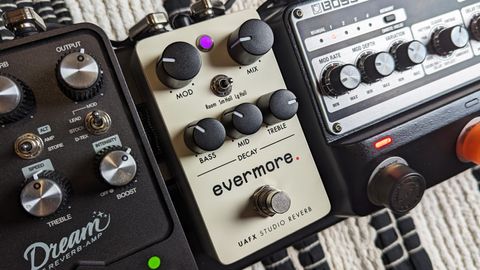Universal Audio UAFX Evermore Studio Reverb pedal: What is it?
One of four pedals in the first wave of smaller UAFX pedals, the Evermore builds takes some of the algorithms from its flagship reverb pedal, the Golden Reverberator, and hones in with switchable room, small hall and large hall modes. In return for a smaller footprint and 1/3 of the larger reverb's sounds there's a saving of $180 on the Golden Reverberator's full retail price. Because not everyone wants all the classic reverb sounds, all the time.
We already know the sounds on the Golden Reverberator are in the very best of their class after we reviewed it on release. This pedal is focussed on the Hall 224 mode of that pedal; named after the Lexicon 224 Digital Reverb. UA already make a plugin of this "using the exact algorithms and control processor code from the original hardware". But in this era of emulated spring reverb tanks and lush plate decay, isn't an emulation of a digital reverb a bit… old hat?
All you recording connoisseurs out there will know the Lexicon 224 is very special indeed. The hardware was a bit of a revelation when it arrived in 1978 with nine algorithms and became the best-selling studio reverb of all time – ingrained in classic recordings throughout the '80s. UA already developed a comprehensive software version, and while this pedal offers three instead of the original hardware's nine algorithms, it offers individual controls for mid, bass and treble decay time. It makes for quite an interesting experience with the pedal version, as it did on the Golden Reverberator.
Dropping the plate reverbs of the Lexicon certainly makes sense here in the context of the Golden Reverberator, because that pedal focussed on emulations of the real-deal EMT 140 from 1957 too, as well as spring tank reverb. So does this streamlining work in a standalone pedal?

Universal Audio UAFX Evermore Studio Reverb pedal: Performance and verdict
One feature absence might be inexcusable for some players; this is a digital reverb with no stereo output. The Golden Reverberator has stereo, this does not. It's not an accidental oversight, it looks like UA has purposefully aimed these at a different user. Sorry stereo rig musicians – it's not you. I will say after experiencing the stereo delights of the 224 mode on the GR, it is the most frustrating stereo omission of the four compact pedals for me. But it's clearly not a dealbreaker for anyone who doesn't need it.
While the pedal is a much more low-key look than the larger UAFX units – of which the Golden Reverberator was a particularly good-looking design – like the other more compact pedals it's also standalone in that it doesn't connect with the UAFX Control app via Bluetooth. That simplifies things and to that end there are switches on the back to turn Predelay on and off plus buffered (Trails) and true bypass. There is a USB input for possible firmware updates too.

The Evermore's reverb range can take you from very subtle small room to slapback and the endless chasms of space. It is a low key shoegaze weapon with its later territory.
Because it's not the usual reverb pedal setup, the three-band decay time approach needs consideration to explore in relation to the Mix control; it's the key to the unique reverb effects this pedal can provide. For example, it will allow you to focus huge sustaining presence in your bass notes for a fingerpicking part, with just a subtle touch elsewhere. Or vice verse to add sustain and space to accentuate ringing highs in solos. It's very impressive, the overtones can sound glorious and it all allows for a real sense of nuance from a compact pedal.
Of course, you don't have to go deep – you can just keep things balanced too and still explore plenty of sounds with the Mix and Modulation.
The predelay switch at the back changes the feel of playing considerably but can't be dialled to the player's taste like the Golden Reverberator's control – it's on or off with the LED changing from purple to red when it's engaged. In comparison to a rotary control, it's not the easiest thing to activate in the heat of the moment between songs live either.

We see a fair amount of stick being given to UA online for its pedal pricing and it's easy to round on a big organisation, but let's take a step back
While cheaper than the more featured larger Golden Reverberator and Del-Verb pedals, $219 still isn't cheap for a digital pedal, but where UA continue to excel is the quality of sounds. This is result of its years of investment and expertise in emulating hardware in plugins that is now paying dividends in pedals. UA are at the bleeding edge of digitally emulating classic vintage reverb and it shows again here – it's ultimately what the price of admission is for. The UAFX pedals sound consistently great.
We see a fair amount of stick being given to UA online for its pedal pricing and it's easy to round on the big organisation, but let's take a step back. Though the Evermore's more authentically complete competition is the accurate emulation of the 224's sounds (and controls) in the Chase Bliss and Meris collaboration CXM 1978, it costs $899. The DigiTech Supernatural is discontinued (but doesn't offer the same three-band decay options as the Evermore), and the original Lexicon unit still costs thousands even used, and was $7,500 when it was released in 1978 . Like the 1176 pedal I reviewed, this is the most affordable entry price for an emulation of a very specific and highly-rated piece of studio hardware.

But as good as those sounds are – and UA clearly deems them good enough to reuse in multiple pedals now – it just seems to highlight for me the odd functionality missteps elsewhere that some other higher-end pedal brands don't make. It's as if the two core chassis types UA has chosen for its pedals dictate their features a little too strictly. We already know UA has no intention of making its pedals MIDI-compatible for the foreseeable future, but the lack of stereo here is a negative.
If you can stretch to it – or find it on sale – the Golden Reverberator is a better investment because it packs three times the goodness, stereo, controllable predelay, and really is one of the very best reverb pedals you can buy right now. But if plate and spring options don't appeal, it simply won't be worth it for you. And that's really what this widening of the UAFX pedal range is about; more buying options.
MusicRadar verdict: The most affordable authentic Lexicon 224 sounds available in a reverb pedal right now, the Evermore is glorious and versatile but those with stereo and more predelay control needs will need to look to the Golden Reverberator.
Universal Audio UAFX Evermore Studio Reverb pedal: Hands-on demos
Mark Johnston
Rabea Massaad
Mark Hopkins
Andertons
Universal Audio UAFX Evermore Studio Reverb pedal: Specifications

- TYPE: Pedal emulation of the Lexicon 224 digital reverb's sounds
- CONTROLS: Modulation, Mix, Room / Small Hall / Large Hall mode mini toggle switch, Bass / Mid / Treble Decay, bypass footswitch, Trails / True bypass switch, Predelay on/off switch
- POWER: 9V DC pedalboard isolated power supply (250mA power draw)
- CONTACT: Universal Audio


